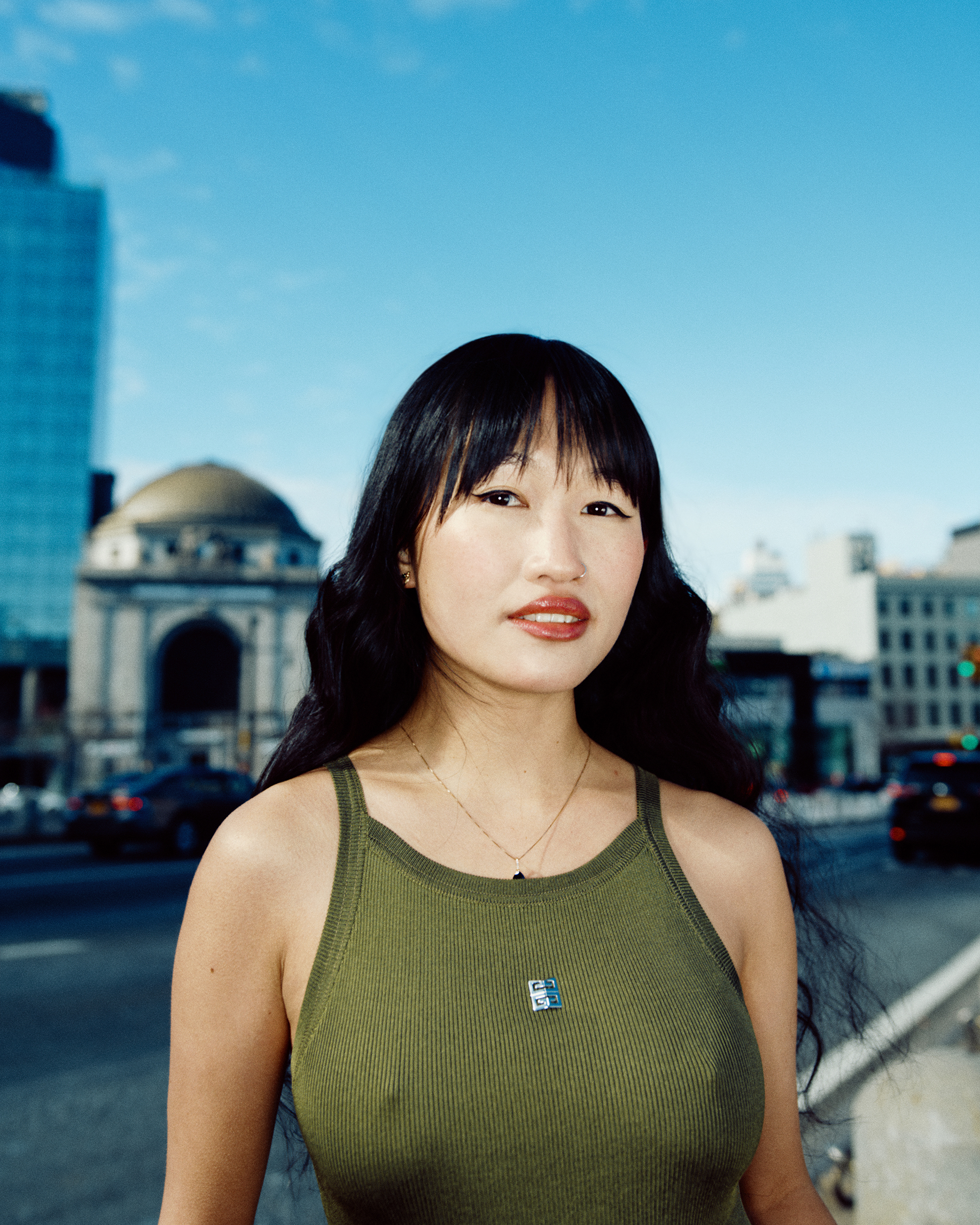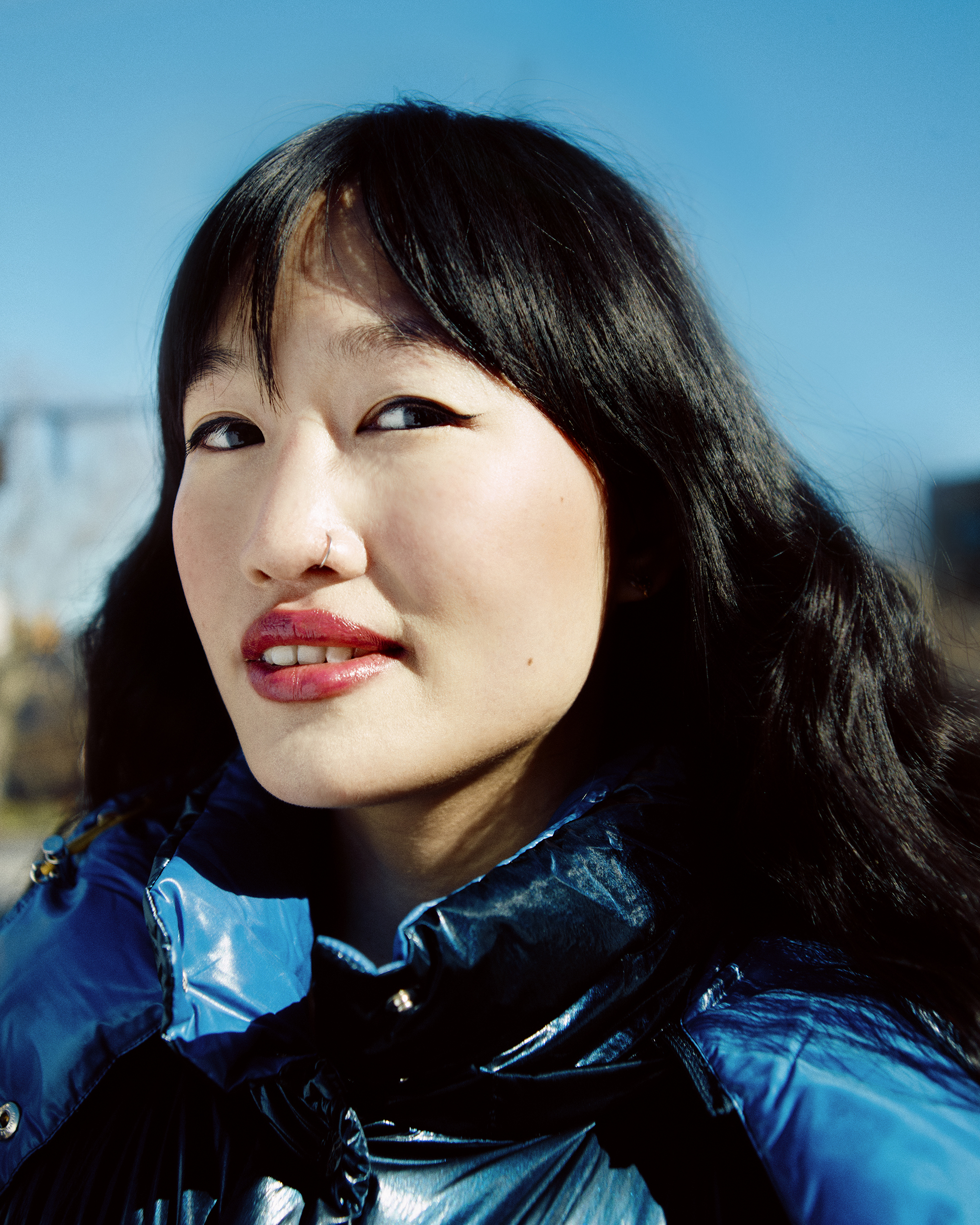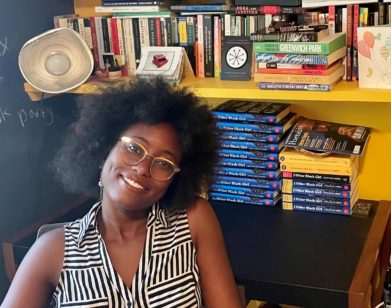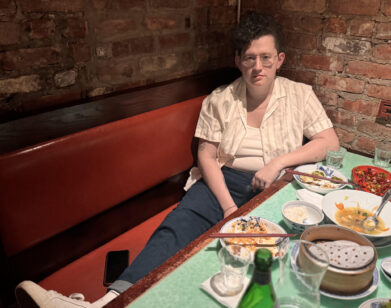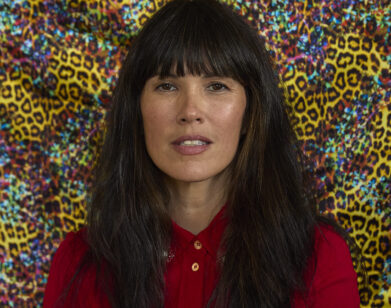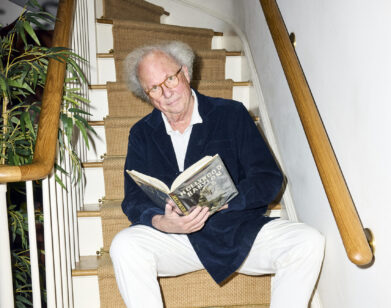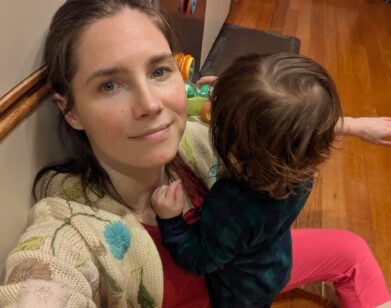PLAGIARISM
R.F. Kuang on White Paranoia and the Pitfalls of Identity Politics
Rebecca F. Kuang had never spoken to writer Zakiya Dalila Harris before this interview, but the best-selling novelists—who have both written about the publishing industry’s thirst to capitalize off of race and identity—were ready to get into it. Yellowface, R.F. Kuang’s latest novel, follows a young white woman, June, as her life blossoms—then unravels—after plagiarizing a book written by her Asian-American “bestie,” Athena. It’s a satirical story about the pitfalls of identity politics that for both writers, is a little too familiar.
———
ZAKIYA DALILA HARRIS: It’s so nice to meet you.
R.F. KUANG: You too! Oh my gosh. I need to get all my fangirling out of the way before we start. One of my closest friends and I started reading The Other Black Girl the moment it came out in 2021, and we screamed and chatted about it for weeks. When I told my friend I was going to talk to you, she didn’t believe it. We’re both huge fans!
HARRIS: Thank you so much. I feel like our books are related, like sisters. I loved your book, and for me the biggest indicator of when I’m reading or watching something compelling is, I keep telling my husband every single thing that’s happening. This character, June, is so complicated, and I don’t like her, but I really like her, and I love reading about this journey that she’s falling down. I know this isn’t your first novel. You’ve written fantasy in the past. How did this come about?
KUANG: Yellowface is a big gear shift for me. I’d never really written literary fiction before. I don’t think it’s the kind of book I could have written as a debut novel either, because I hadn’t worked in a publishing house, and it took those five years of frustration, toil, and a lot of tears in the publishing industry on the author’s side to accumulate the experiences that when into it. But yeah, I mostly published fantasy novels before I started writing Yellowface. My first trilogy, The Poppy War trilogy, was inspired heavily by my parents and grandparents’ experiences over the very tumultuous period of 20th-century Chinese history. I started writing that as an undergrad, just starting to reconnect with my extended family for the first time, learning Chinese history, and learning to speak Chinese. So it’s that classic story of wanting to represent everything about me, my heritage, my culture, my history, in a novel. But really, Yellowface is my pandemic novel. You can always tell when a book is someone’s pandemic novel. There’s something weirdly psychological going on. Like, “Oh, you were lonely, you were depressed, you were not talking to your friends. You hated everything. You put that all into this book.” It explains it all.
HARRIS: You got the publishing world so spot-on in the book, like the details of sensitivity reads and what it’s like to be an assistant of color working on a book. What was the experience like for you?
KUANG: Let me abstract a bit at the risk of turning this into a drag-a-bitch, tag-a-bitch game. I think a lot of writers of color, or marginalized writers in general, are struggling with what to do with the process of taking something intensely personal—oftentimes writing about personal trauma, family trauma, a lot of pain that’s tied to our identity—and turning that into a story that then, because of the nature of publishing, has to be commercialized, commodified, and marketed. So many things that are deeply complicated, nuanced, personal, and important, get turned into these zippy little buzzwords. For example, when six Asian women were murdered in Georgia two years ago by a shooter, immediately what happened were all these lists that circulated: “Here are the Asian women that you ought to read.” Editors hit me up in my inbox. “I want to see your think pieces on how traumatic it is to be an Asian woman. Your group has suffered and your pain is the only interesting thing about you. So now your work is timely.” And then having all of your work be published and promoted through that lens. It was true even with the promotional campaigns for my fantasy novels. People would ask me, “What’s the most painful thing your family has ever suffered?” And it’s like, “This is a fantasy novel. I didn’t live through that. It’s not a family autobiography. It’s loosely inspired by my family’s stories, but I’m not here to just sit on a stage and tell you sob stories so you can give me money. That’s not how this works. I want you to take me seriously as a storyteller.” The assumption is, since the only interesting thing about you is your pain, everything must be autobiographical, everything must be transparent and delivered up on a platter for pitying white readers. That’s the really icky commodification of race and identity.
HARRIS: I absolutely experienced the same thing with my book, with the intent, of course, of talking about how messed up the world of publishing really is in the way that we commodify voices of color, we commodify certain situations. But then it’s also, as an artist putting that story out there, am I commodifying myself? Was Yellowface a story you wanted to tell for a while?
KUANG: I think the question of a writer’s relationship to pain, especially other people’s pain, is at the heart of the book and is also an ethical dilemma that I haven’t figured out, because so much of my work comes from the pain of people who are very close to me. I’m thinking about this a lot right now because I think for my next novel, I’m finally going to do the thing that scared me all this time: write something that is very autobiographical and inspired by my dad’s experiences growing up as a college student in China, living through the Tiananmen Square massacre, immigrating to the U.S.—that very specific American Dream novel. But it’s something that’s so painful for him and something he wants to work on with me. But that’s delicate. And then when it’s out there, it’s up for so many different interpretations. People will read it in the worst possible light, and that’s terrifying to me. I don’t really know the answer, but in the case of Yellowface, I have a simpler approach, and that is just that Athena’s a bad person. Athena is my worst nightmare. She’s all the things I hope will never be true of myself. And it’s because she has learned very early on in her career that she can get a lot of attention by telling a particular kind of story, which is the story of Asian pain. So she has benefited immensely from acting as a cultural broker, depicting Chinese-American stories in a certain way to maximize the attention and interest she gets from it. Which means that she also is deeply suspicious of all other Asian creatives. Your novel’s entitled The Other Black Girl. Athena has the “other Asian girl” problem where, I included a scene where it was very explicit that she hates other Asian writers reaching out to her. She does not want to mentor anybody, she doesn’t want peers, because the moment there’s somebody else who has her experiences, who looks like her in the room, she’s not special. She isn’t that cultural broker. White people don’t need to rely on her to explain China, to explain Chinese Americans, to explain their history. And that’s a threat to her. So she’s had this long career of being a magpie, selecting the most interesting parts of her own family history, lying about her family history in order to get more attention, and writing about traumatic parts of Chinese history that she never directly experienced or has any familial tie to. Maybe she’s a good writer. But the question is, is she contributing anything other than sob stories for white people to consume? And that’s an open question. But I’ve tried to make it very explicit that her place in the community and her own community is very fraught.
HARRIS: What is your process like in writing such a layered book? How did you settle on the voice?
KUANG: There are books that require a lot of chiseling, tinkering, and experimentation before you get the tone right. For most of my epic fantasy work, because they are such sprawling and structurally complicated novels, I was used to this process of trial and error and building things up piece by piece. I was stunned when Yellowface just dropped into my head whole the way that it did. I really like the novelist John Banville and I was reading some interviews he’d done, and he mentioned that once he tried writing in an alternate voice, like a crime thriller, and suddenly he’d written paragraphs and paragraphs, and he thought to himself, “John, you slut.” That’s how I felt drafting the first 3,000 words of Yellowface. It was just pouring out and I thought, “Becky, you slut. What are you doing?”
HARRIS: I love that.
KUANG: The reason why it was so easy to write from June’s perspective was because I know June. We all know June. She’s not one particular person, but she’s the condensed point of all of this negative energy that I’ve experienced through publishing. She’s all the white paranoias, and suspicions, and jealousies, and arrogance that I’ve dealt with. I know that voice because I hear it constantly. I hear it so much that in a way I’ve internalized it and it becomes my own worst critic. When I think I’m getting a bit too successful, or I’m thinking too highly of my work, June’s voice speaks up and says, “No, you don’t deserve this. You’re not that special. The only reason why you’re getting any of this attention is because you’re Asian and a minority.” It’s hard to have that voice constantly present with you, because I think that any marginalized writer with any degree of success, or a platform, starts internalizing that doubt, because those accusations are made about us constantly. So in a way it was very cathartic to finally put her voice on the page because that way I have some semblance of control over it.
HARRIS: Totally. Like you said, we all know Junes. And yet, I don’t think it’s a matter of only June being evil. There are so many other forces at play that are creating the environment where she feels she needs to steal this story as her own.
KUANG: She’s been terribly wronged by publishing. The thousand little cuts of having a book come out on shelves and nobody cares about it and nobody buys it. You get lukewarm reviews, if you get any reviews at all. That’s a debilitating, soul-shattering process, and it’s enough to make anybody give up on writing. I think that’s something we don’t talk about enough— the psychological effect that publishing has, because writing is such a personal thing. You spend so long pouring your soul onto these pages and then you offer it up for anybody to flip through, and that’s already terrifying. Perhaps what’s even more terrifying is going through all that work to put something out there, and nobody cares, and you’ve just yelled into the abyss.
HARRIS: You also take into consideration Twitter and all the social media voices that infect the novel. It’s so wonderful when people are on your side, but horrifying to have people posting about you. It can really affect your mental health. It’s something that authors didn’t have to deal with 20 years ago, and I think at some point there will be a reckoning of how much we pay attention to it. But I wanted to ask you, who are your favorite unlikable characters from real life or fiction that inspired you?
KUANG: This is a ridiculous answer, but I was channeling my high school self ’s love of Gossip Girl when I was writing Yellowface, because it’s the show that taught me that a character doesn’t have to be virtuous for the reader to be invested in them. They just have to be really interesting. They can do all sorts of horrible things, but as long as you’re still hooked on the page wondering, “Oh my god, what is Blair going to do next,” then you’re still reading to the end of the story.
HARRIS: If the novel were to be adapted, who would be the dream cast?
KUANG: I’ve only cast June in my head, and while I was writing, I saw either Aubrey Plaza or Anna Kendrick doing all the things that June does, and saying all her snarky little comments. And they’re very distinctive comedic voices. I just remember Anna Kendrick from her Twilight days when she was playing the bitchy high school girl, and I think that’s the energy to channel for June.
HARRIS: I wasn’t really familiar with Aubrey Plaza until The White Lotus, but now I’ve been watching everything she’s in and she’s got a very quirky sensibility that I think would be really fun to see as June, too.
KUANG: What about The Other Black Girl? I know that’s being made into a limited series too.
HARRIS: Yes, I just got back from set in Atlanta. We just wrapped, so we’re hoping.
KUANG: That’s incredible. Good luck with everything!
HARRIS: You too.
———
Hair: Hide Suzuki using Oribe
Makeup: Grey Hoffman
Photography Assistant: Tim O’Connell

